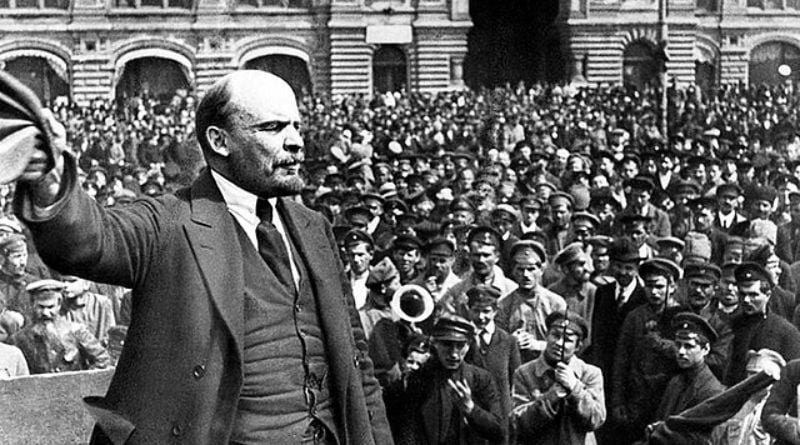
Vladimir Lenin, an influential figure in the 20th century, stands as a symbol of revolution, communism, and a legacy that fuels ongoing debates. Let’s dive into the life and times of this intriguing leader, tracing his extraordinary journey from a destitute lawyer to the mastermind behind the Russian Revolution and the founder of the Soviet Union.
Born Vladimir Ilyich Ulyanov in 1870 in Simbirsk, Russia, Lenin’s early life blended privilege with tragedy. His father, a school inspector, instilled a thirst for knowledge and a sense of social injustice. However, the execution of his older brother Alexander for plotting against Tsar Alexander III planted the seeds of revolutionary fervor in Lenin’s young mind.
Embracing Marxism: Shifting from Law to Revolution
Initially pursuing law at St. Petersburg University, Lenin’s interests pivoted towards Marxism. Immersing himself in the works of Marx and Engels, he became convinced of capitalism’s exploitative nature and the inevitability of a socialist revolution. Joining the Social Democratic Labor Party (SDLP), Lenin dedicated himself to organizing workers and fostering dissent against the Tsarist regime.
The Spark of Revolution: 1905 and Its Aftermath: The Russo-Japanese War of 1904-1905 marked a turning point, exposing the weaknesses of the Tsarist regime. Leading the Bolshevik faction of the SDLP, Lenin seized the opportunity, catalyzing workers’ protests culminating in the failed 1905 Revolution. Although suppressed, the revolution fueled Lenin’s radical vision and propelled him to prominence within the party.
Exile and Ideological Refinement: Sharpening the Revolutionary Blade: After the failed revolution, Lenin went into exile, spending years in Europe refining his political skills and ideological stance. Clashing with moderate factions within the SDLP, he advocated for a disciplined and centralized party structure, focused on violent means to overthrow the Tsarist regime. Lenin’s return saw the formulation of his infamous “April Theses.”
Return to the Motherland: Riding Discontent’s Waves: World War I’s outbreak in 1914 provided another opportunity. Lenin condemned the war as an imperialist conflict fueled by greed and predicted its collapse. Advocating for defeatism, he gained support, and the February Revolution of 1917 toppled the Tsarist regime, facilitating Lenin’s return to Russia.
The Power Grab: From Kerensky to Bolshevik Triumph: Post-February Revolution, a provisional government under Alexander Kerensky struggled to restore order. Lenin, capitalizing on public discontent, rallied the Bolsheviks with promises of “Peace, Land, and Bread.” His strategic maneuvering culminated in the swift October Revolution of 1917, bringing the Bolsheviks to power.
Building a Red Colossus: The Birth of the Soviet Union: With the Tsarist regime ousted, Lenin faced the challenge of solidifying power and transforming Russia into a socialist state. Establishing the Council of People’s Commissars, he signed the Treaty of Brest-Litovsk, ending Russia’s involvement in World War I. Lenin’s policies, including nationalizing industries and collectivizing land, laid the foundation for the USSR in 1922.
Reign of the Hammer and Sickle: Dictatorship and Industrialization: Lenin’s rule combined revolutionary zeal with ruthless pragmatism. Instituting a one-party dictatorship, he suppressed dissent and pursued rapid industrialization through ambitious Five-Year Plans. Despite economic progress, this era was marked by repression, censorship, and the emergence of a totalitarian state.
Shadows of Illness and Succession: The End Approaches: Lenin’s relentless work took a toll, and in 1922, he suffered strokes, leaving him partially paralyzed. A power struggle ensued, with Trotsky and Stalin emerging as contenders. Warned by Lenin about Stalin’s ambitions, the leader passed away in 1924, leaving a fragile state and a controversial legacy.
Echoes of Lenin’s Revolution: A Fractured Legacy
Lenin’s impact on the 20th century is undeniable. Shattering the Tsarist regime, igniting the communist revolution, and founding the Soviet Union, he influenced global politics. Yet, his legacy is contested due to ruthless tactics and suppression of dissent.
Lenin’s image as a revolutionary hero clashes with his role as a tyrannical dictator. Historical revisionism reveals darker aspects of his rule, necessitating a nuanced understanding of his revolutionary ambition and policy costs.
Lenin’s life offers lessons on the dangers of unchecked power, utopian ideals, and the importance of democratic values. Studying his rise and fall prompts critical examination of revolutionary movements, ensuring social justice pursuits avoid authoritarianism.
Reducing Lenin to a hero or villain oversimplifies his complex legacy. Engaging with his historical context allows a comprehensive understanding of this pivotal figure in human history. Vladimir Lenin’s revolutionary spirit left a global impact, urging us to grapple with idealism, ambition, and the human cost of revolution.



